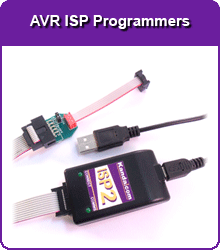Selected Category and Product:
Programmers-Burners » In System Programmers (ISP) » AVR ISP Programmers » AVRUPDI
Secure Payment by

AVR UPDI Programmer
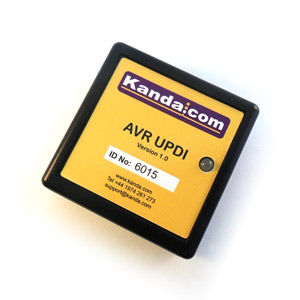
- Supports AVR UPDI, AVR TPI, AVR JTAG and AVR ISP programming
- Includes 10 and 6-way ISP, 6-way UPDI adapters
- Programmer can power target at 3.3V or 5V
- Includes serial numbering, CRC Checksums, RC Cal and more
- Support for all memory areas including User Row,
- 12V Generator Module Available - see accessories
Shipping to United States
Recorded Airmail: $15.00
Fedex Express: $39.00
Recorded Airmail: $15.00
Fedex Express: $39.00
Order Code
AVRUPDI
AVRUPDI
Price: $129.00
In Stock
Related Products
Atmel AVR UPDI Programmer
Kanda's latest USB AVR programmer supports AVR ISP, TPI, JTAG and UPDI programming interfaces. It is fast and reliable with Kanda's popular software interface to make your device programming as efficient as possible. It can power target AVR or target can be powered.AVR UPDI Programmer Features
- Supports ISP, TPI, UPDI programming JTAG programming with optinal adapter
- Can power target circuit at 3.3V or 5V
- 12V generator module available to enter TPI/UPDI if fuses are set to GPIO
- Super drive capability to deal with capacitors, UART chips etc.
- Supports Atmel ELF production files
- Supports MPLAB combined Hex files (including Flash, EEPROM, Fuses, User Row)
- Easy USB install on all Windows OS, including Windows 11, 32 and 64-bit
- Automatic ISP speed setting selects fastest possible programming speed
- Supports target voltages of 1.8 - 5.5V
- 6 and 10-way AVR ISP, 6-way UPDI and 10-way JTAG adapters included
- Flash, EEPROM and User Row buffers for editing in Hex or ASCII
- Erase, Program, Verify and Read for Flash, EEPROM, User Row, Fuses and Lockbits
- Easy to use Fuse setup screens
- Edit fuses in Hex or fuse screens
- Includes serial numbering, checksums and RC calibration byte(s)
- AutoProgram feature with user set options, including
- Reload Files
- Program Fuses First - to change clock or set EESAVE before erase
- Read Calibration Bytes - save to EEPROM or flash for programming
- Increment Serial Number
- Read EEPROM before erase
- Erase, Program and Verify Flash, EEPROM, User Row, Fuses and Lockbits
- Run - release Reset
AVR UPDI Programmer Contents
- USB AVR UPDI Programmer unit - 66 x 66 x 28mm (2.6 x 2.6 x 1.1 inches)
- 1.8m USB A (PC or Hub) to USB B (Programmer) cable
- 0.5m programming lead with Kanda 10-way AVR target interface
- 6-way AVR ISP and AVR UPDI adapter
- Free Software downloads including all updates
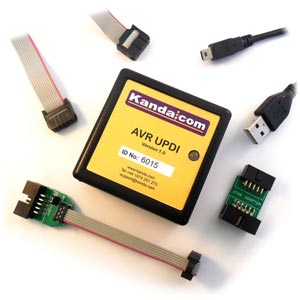
Software Features
- Simple install and detection of each AVR programmer
- Select AVR ISP, AVR TPI, AVR UPDI or JTAG programmer from drop down list
- Full AVR Fuse and Lockbit support on user friendly screen, with improved default values to improve device detection
- Or Edit fuses as Hex values
- Colour coded Flash, EEPROM and User Row buffers can be edited in Hex and ASCII
- User defined serial numbering in Flash, EEPROM or User
- Comprehensive Check Sum support CR16/32, XOR 16/32
- Flexible Auto-program options
- Pop-up Reset on Error feature prevents errors being ignored - can be disabled
- Plug and Program mode - programmer starts automatically when new target is detected, if this mode is set. Now with improved interface to identify programmer and operation.
- Full verify or only Verify pages with data for extra speed
- Clock Source screen uses clock type not Fuse bits for ease of setting correct clock
- Support for Binary files, as well as ELF, Intel Hex, Motorola etc.
- Read Calibration bytes
- Load ELF files, including device, fuses and lock bit settings Supports AVR16EBxx Boot Row
ISP, JTAG, TPI and UPDI Programming Interfaces
AVR ISP is the original AVR programmer interface and includes older AT90S, ATmega and ATtiny microcontollers. It uses SPI interface and is either 6-way or 10-way DIP header, both included. Adapters are available for 10-way 1.27mm and 2.0mm pitch.AVR ISP Interface
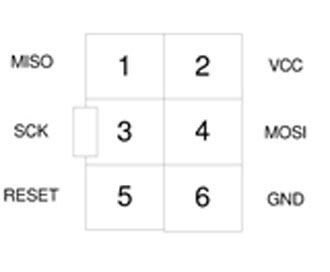
AVR JTAG is available as an alternative AVR programming interface on 40 pin+ older AVR microcontrollers. It is a 4 wire interface and needs JTAGEN fuse enabled. It uses a 10-way interface and adapter is included. .
AVR JTAG Interface
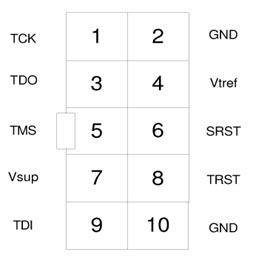
AVR TPI Interface

AVR UPDI is the latest programming interface. It is a serial UPDI and uses a single wire, but is usually used with a 6-way UPDI header, Reset pin is optional. UPDI programming is the interface for the latest ATtiny and ATmega microcontrollers and is the only interface on latest AVRxxx devices.
AVR UPDI Interface
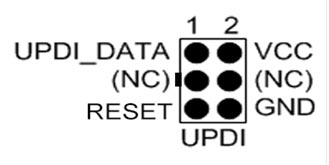
>
AVR Microcontroller Support
Supports all variants like P, PA, PB, L, V etc.
AVR ISP
- AT90CAN128, AT90CAN32, AT90CAN64
- AT90PWM2/3, AT90PWM316
- AT90S1200, AT90S2313, AT90S2323, AT90S2333
- AT90S2343, AT90S4414, AT90S4433, AT90S8515, AT90S8535
- AT90USB1286, AT90USB162, AT90USB646, AT90USB82
- ATmega103, ATmega128, ATmega1280, ATmega1281, ATmega1284, ATmega128RFA1
- ATmega16, ATmega161, ATmega162, ATmega163
- ATmega164, ATmega165, ATmega168, ATmega169
- ATmega16M1, ATmega16U2, ATmega16U4
- ATmega2560, ATmega2561
- ATmega32, ATmega323, ATmega324, ATmega325, ATmega3250
- ATmega328, ATmega329, ATmega3290
- ATmega32C1, ATmega32M1, ATmega32U2, ATmega32U4, ATmega32U6
- ATmega48, ATmega64, ATmega640, ATmega644, ATmega645
- ATmega6450, ATmega649, ATmega6490, ATmega64C1, ATmega64M1
- ATmega8, ATmega8515, ATmega8535, ATmega88PB, ATmega8U2
- ATtiny12, ATtiny13, ATtiny15, ATtiny1634, ATtiny167
- ATtiny22, ATtiny2313, ATtiny24, ATtiny25, ATtiny26, ATtiny261
- ATtiny4313, ATtiny43U, ATtiny44, ATtiny441, ATtiny45, ATtiny461, ATtiny48
- ATtiny828, ATtiny84, ATtiny841, ATtiny85, ATtiny861, ATtiny87, ATtiny88
AVR TPI
- ATtiny10
- ATtiny102
- ATtiny104
- ATtiny20
- ATtiny4
- ATtiny40
- ATtiny5
- ATtiny9
AVR UPDI
- ATmega1608, ATmega1609, ATmega3208, ATmega3209
- ATmega4808, ATmega4809, ATmega808, ATmega809
- ATtiny1604, ATtiny1606, ATtiny1607, ATtiny1614
- ATtiny1616, ATtiny1617, ATtiny1624, ATtiny1626, ATtiny1627
- ATtiny202, ATtiny204, ATtiny212, ATtiny214, ATtiny3216
- ATtiny3217, ATtiny3224, ATtiny3226, ATtiny3227
- ATtiny402, ATtiny404, ATtiny406, ATtiny412, ATtiny414
- ATtiny416, ATtiny417, ATtiny424, ATtiny426, ATtiny427
- ATtiny804, ATtiny806, ATtiny807, ATtiny814
- ATtiny816, ATtiny817, ATtiny824, ATtiny826, ATtiny827
- AVR128DA28, AVR128DA32, AVR128DA48, AVR128DA64
- AVR128DB28, AVR128DB32, AVR128DB48, AVR128DB64
- AVR16DD14, AVR16DD20, AVR16DD28, AVR16DD32
- AVR32DA28, AVR32DA32, AVR32DA48, AVR32DB28
- AVR32DB32, AVR32DB48, AVR32DD14, AVR32DD20
- AVR32DD14, AVR32DD20, AVR32DD28, AVR32DD32
- AVR64DA28, AVR64DA32, AVR64DA48, AVR64DA64
- AVR64DB28, AVR64DB32, AVR64DB48, AVR64DB64
- AVR64DD14, AVR64DD20, AVR64DD28, AVR64DD32
- AVR64EA28, AVR64EA32, AVR64EA48
- AVR16EB14, AVR16EB20,AVR16EB28, AVR16EB32
AVR JTAG
- AT90CAN128, AT90CAN32, AT90CAN64
- AT90USB1286, AT90USB162, AT90USB646, AT90USB82
- ATmega128, ATmega1280, ATmega1281, ATmega1284, ATmega128RFA1
- ATmega16, ATmega162, ATmega164, ATmega165, ATmega169
- ATmega16U4, ATmega2560, ATmega2561
- ATmega32, ATmega324, ATmega324, ATmega325, ATmega3250
- ATmega329, ATmega3290, ATmega32U4, ATmega32U6
- ATmega406, ATmega64, ATmega640, ATmega644
- ATmega645, ATmega6450, ATmega649, ATmega6490
Comparision with other UPDI AVR Programmers
Kanda handheld programmers and Kanda Keyfob Programmers support ISP, JTAG and UPDI if you need a standalone solution that programs without a PC or laptop. These are great for field updates or on the production line. This AVR UPDI programmer is better for development and small volume production.Atmel ICE supports UPDI but it uses Atmel or Microchip Studio software, which is very clunky for programming operations. PICKit 4 also supports AVR UPDI using MPLAB X MPE software. There are also some Arduino UPDI solutions but they are more for amateur use.
Kanda AVR programmer software is better as it has lots of features like buffer edit, serial numbers, checksums that other software does not have. It is also much easier to swap between ISP, TPI, JTAG and UPDI programming.
Documentation
This opens in a new window.
Ordering Information
| Ordering Information | Order Code: AVRUPDI | Price: $129.00 |
| Shipping to United States: | Recorded airmail - $15.00 | Fedex Express - $39.00 |


